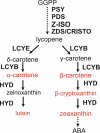Natural genetic variation in lycopene epsilon cyclase tapped for maize biofortification
- PMID: 18202289
- PMCID: PMC2933658
- DOI: 10.1126/science.1150255
Natural genetic variation in lycopene epsilon cyclase tapped for maize biofortification
Abstract
Dietary vitamin A deficiency causes eye disease in 40 million children each year and places 140 to 250 million at risk for health disorders. Many children in sub-Saharan Africa subsist on maize-based diets. Maize displays considerable natural variation for carotenoid composition, including vitamin A precursors alpha-carotene, beta-carotene, and beta-cryptoxanthin. Through association analysis, linkage mapping, expression analysis, and mutagenesis, we show that variation at the lycopene epsilon cyclase (lcyE) locus alters flux down alpha-carotene versus beta-carotene branches of the carotenoid pathway. Four natural lcyE polymorphisms explained 58% of the variation in these two branches and a threefold difference in provitamin A compounds. Selection of favorable lcyE alleles with inexpensive molecular markers will now enable developing-country breeders to more effectively produce maize grain with higher provitamin A levels.
Figures



References
Publication types
MeSH terms
Substances
Grants and funding
LinkOut - more resources
Full Text Sources
Other Literature Sources

